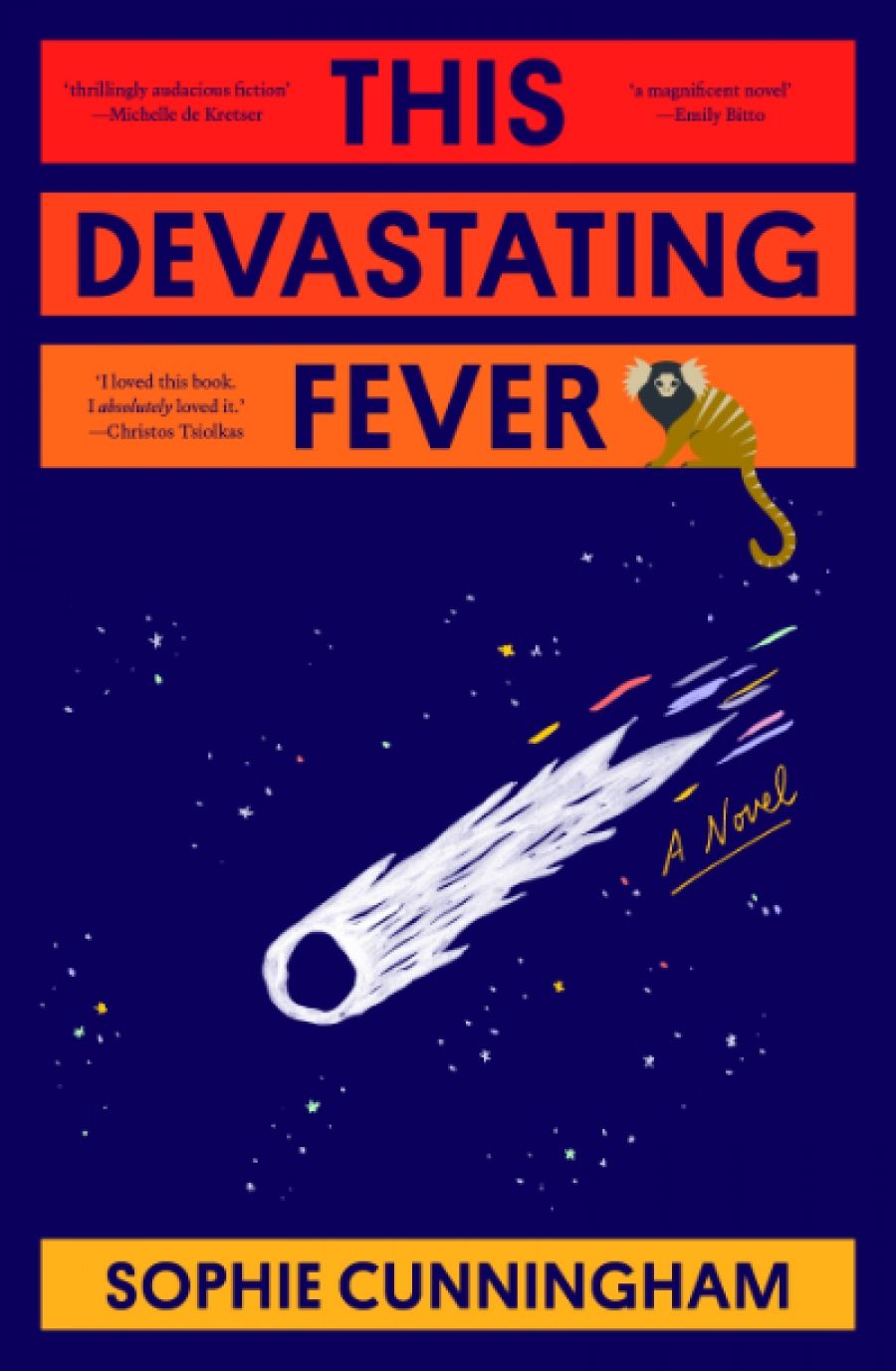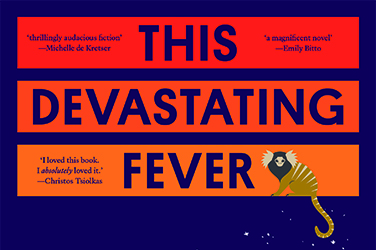
- Free Article: No
- Contents Category: Fiction
- Review Article: Yes
- Article Title: Spectres and refractions
- Article Subtitle: Sophie Cunningham’s new novel
- Online Only: No
- Custom Highlight Text:
Early in This Devastating Fever, a writer named Alice has a difficult conversation with her agent, Sarah, about the novel she is working on, which she is considering calling This Devastating Fever. The novel is supposed to be about Leonard Woolf, left-wing journalist and activist, novelist, publisher, best-selling memoirist, and husband of Virginia Woolf, whom he outlived by almost thirty years. Things are not going well for Alice, however. She cannot settle on a theme (the parallels between Leonard’s era and her own proliferate alarmingly) or an approach (experimental approaches have failed her, historical fiction bores her), and her agent is increasingly concerned. In its current iteration, the book is both fiction and non-fiction – which makes it potentially unsaleable, Sarah tells Alice sternly. Forced to choose, Alice picks fiction.
- Article Hero Image (920px wide):
_Credit%20%E2%80%93%20Alana%20Holmberg%20copy.jpg)
- Article Hero Image Caption: Sophie Cunningham (photograph by Alana Holmberg)
- Alt Tag (Article Hero Image): Sophie Cunningham (photograph by Alana Holmberg)
- Featured Image (400px * 250px):

- Alt Tag (Featured Image): Ann-Marie Priest reviews 'This Devastating Fever' by Sophie Cunningham
- Book 1 Title: This Devastating Fever
- Book 1 Biblio: Ultimo Press, $32.99 pb, 310 pp
- Book 1 Readings Link: booktopia.kh4ffx.net/ORxj5P
I was not very far into the book before I began to wish that she – or, rather, the extra-textual author, Sophie Cunningham, of whom Alice is a refraction – had chosen differently. The metafictional frame comes with few benefits, and some very obvious disadvantages. Alice, hard-pressed and perpetually anxious, is not an engaging guide to Leonard Woolf’s life and significance. An overtly non-fictional narrator might have been able to deploy the techniques of a good personal essay or memoir (genres in which Cunningham is adept) to create a sense of warmth and intimacy. The fictional Alice, by contrast, feels distant, her narrative oddly stilted and uneasy. Too often her humour feels arch, while her self-excoriation, over the two decades her book is in progress, is wearing.
The book alternates between scenes from Leonard Woolf’s life – the straight historical fiction Alice deplores – and scenes from Alice’s as she goes about researching and writing her novel. The Alice sections, written in the third person, constitute ‘an exploration of the writing process’, an attempt to provide ‘the kind of conventional narrative readers seem to require’. (I confess I felt mildly affronted at being told – and so dismissively – what I required.) Alice fears she is not good enough to write this novel, or any novel, and her self-doubt seldom wavers. She is hyper-vigilant in anticipating any and every possible criticism. Why write about Leonard and the Bloomsbury set, those upper-middle-class twits? Why bother to write still more about Virginia, one of the most-written-about women of the twentieth century? Why write at all, since novels themselves are pointless, words meaningless? Even Leonard and Virginia join the pile-on. Ghost Virginia tells Alice that her desire to write about Leonard is a symptom of her ‘investment in patriarchy’, while Imaginary Leonard declares her novel to be ‘a product of our imperial culture’.
These spectral characters, Alice’s imaginary friends, bring a welcome gleam of lightness to the book, popping up from time to time, individually or together, to give Alice their views on their own lives and, in a more limited way, on hers. Unfortunately, Alice does not give them enough air. They never quite manage to surprise us, to become more than what Alice finally declares them to be – parts of herself.
This is particularly frustrating when it comes to Leonard, whose life has been beguilingly told in non-fictional form by Victoria Glendinning (Leonard Woolf: A life, 2006). Alice does a good job of depicting the violence and mental confusion of his time as a colonial administrator in Ceylon (present-day Sri Lanka), a position to which he was appointed in 1904, at the age of twenty-our, straight out of Cambridge. The experience opened the young man’s eyes to the catastrophic effects of British imperialism, and he returned to England in 1911 aflame with anti-imperialist ideals. At this point, however, Alice turns her attention to his marriage, not even touching on his conversion to socialism (as a result of his exposure, through Virginia’s friends, to the poverty and suffering in London’s East End) and his long career as left-wing journalist, stalwart of the British Labour Party, active member of the League of Nations Society, and expert on world economics. What Alice draws from Leonard’s life is his sense of failure rather than his tireless efforts to make the world a better place. This sense of failure she equates with her own inability to finish her novel – and by extension her depression and despair over the decline of civilisation. In the 2021 section of the novel, Imaginary Leonard suggests that she simply stop working on her book: ‘As much as I’ve enjoyed the attention, this novel, it doesn’t matter. We don’t matter. Nothing really does.’ Alice gets the same advice from her long-suffering agent, who tells her to hand over whatever she has by the end of the month so that she can try to sell it. Alice agrees, partly, it seems, because she needs the money: she wants to build a Woolfian greenhouse.
There is a certain risk involved in this depiction of ‘the writing process’. If nobody believes in this novel – not its (fictional) writer, nor her (fictional) agent, nor her imaginary friends – why should the reader? It’s hard not to feel that Alice is palming off on her eager public an inferior product simply because she’s sick of the labour of writing and needs an injection of cash. And yet the final sections of her novel are unexpectedly moving. Has Alice finally found her way to the beginning of her interminable project? Perhaps she is not so much the author’s avatar as her plaything, and the novel is a brilliantly parodic meditation on the failure of the contemporary writer to write her way through the myriad catastrophes of our time. Or perhaps it is simply what Alice tells us it is: a torturous attempt to rescue a failing historical novel by turning it into a metafictional one. Either way, I couldn’t help but feel that Leonard Woolf has been somewhat short-changed.


Comments powered by CComment